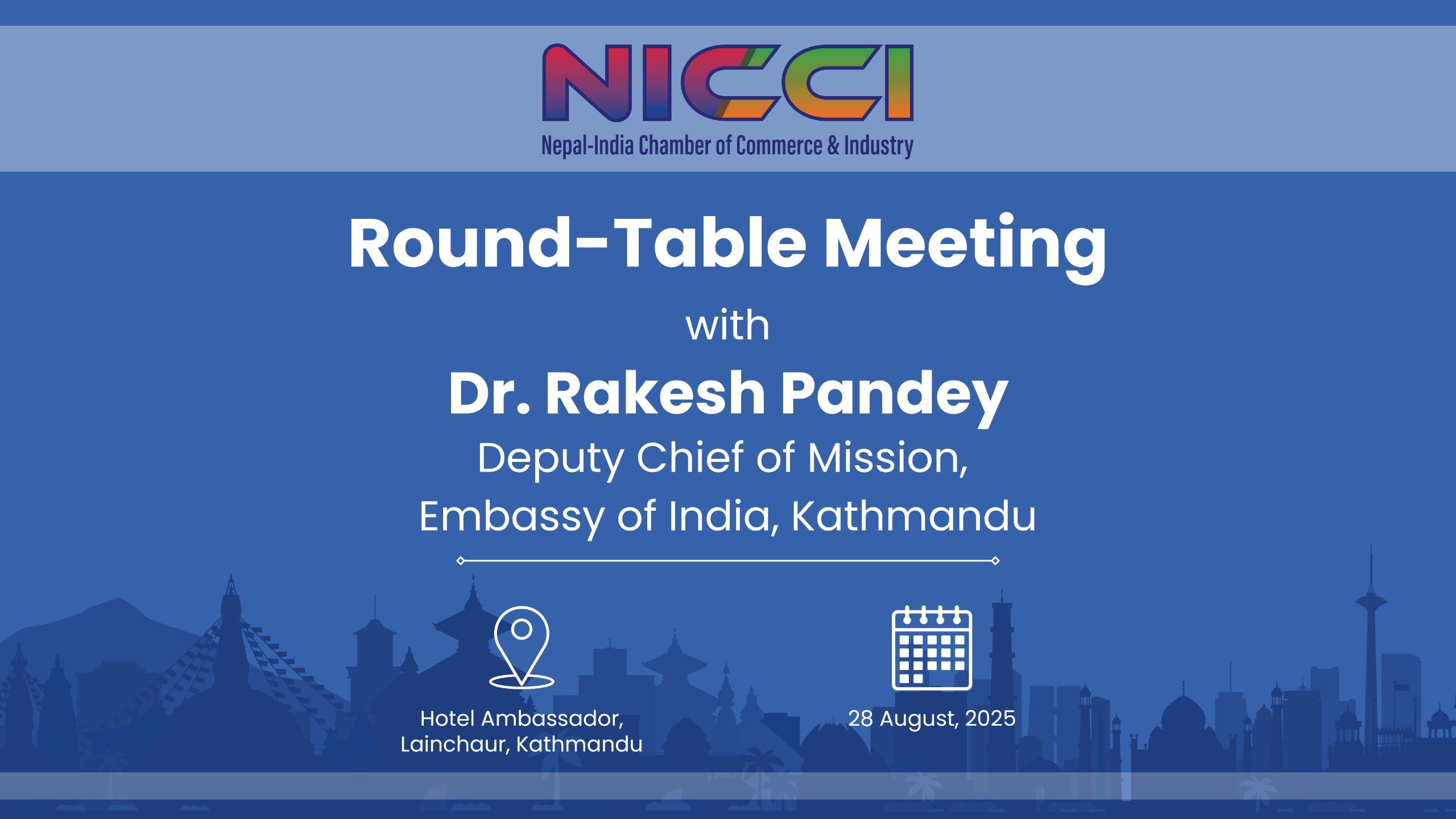Despite lower tariffs, Nepal's exports to India have not grown as expected. What are the most critical non-tariff barriers and administrative hurdles still holding back Nepali exporters, and what concrete steps should be taken to address them?
There may be various factors involved in export of goods from Nepal in consequences of which the expected growth in Nepal's export to India could not take place. The few major barriers or let's say obstacles may be: The procedures and regulation across various Indian border customs are varied and do not align with each other, the non-acceptance of Nepali certification for quality, disparity of custom duty on import of industrial raw materials and finished products, lack of good behaviour in border agencies, and non-availability of consolidation facilities for small trades drive the logistic cost very high, due to which the products fail to compete in global market price.
Nepali goods like cement, footwear, and sanitary products face long delays in securing Bureau of Indian Standards (BIS) certification, impacting exports. What specific actions can the chamber take to push for faster, mutual recognition of standards between the two countries?
This issue has been affecting Nepali industries' export to India as some of our members also have come to us with this complaint. We have requested the Embassy of India to take this issue to the concerned Indian authority, BIS; few cases have already been sorted out partially but it needs to be addressed as soon as possible with the completion of appropriate procedure. Issues of at least those industries which have already submitted their applications along with required documents should be addressed on priority basis.
Indian industry associations like CII and FICCI are powerful policy influencers, while Nepali counterparts are seen as fragmented and weak. What are the structural or political reasons for this, and how can the NICCI become a stronger advocate for Nepali business interests?
Yes, in India, the Indian associations are influential due to their existence for over a century. They have strong national networks, a broad member base and engage professionally to address key issues. NICCI works seriously in advocating the business interests of Nepali business community. NICCI is working to expand its connections and partnership with Indian organisations for collaboration to foster the growth of Nepali trade and business in the near future. NICCI is poised to partner with business and trade associations in India shortly.
The automatic renewal of the Nepal-India Trade Treaty in 2023 was criticised as a missed opportunity for Nepal. How can the participation of the private sector be increased in formulating Nepal's trade policy and agenda?
The 1996 Nepal-India Trade Treaty is considered to be the favourable trade treaty for enhancing Nepal's trade, especially for the export of Nepali products to India and Nepal's economic growth with provision of renewal in the timeframe of every seven years. If any clause, points or articles of this treaty has to be ratified or changed, the proposal should be tabled before the renewal date through IGC meeting. If no proposal is tabled, then it is renewed automatically for the next seven years period again.
Experts and business leaders have frequently raised the voice calling for change in the Nepal-India trade treaty citing changed business environment, international trade practices, demands and advent of technology and its application in the businesses in the contemporary time compared to 1996 when the trade treaty was signed. A timely trade treaty is essential to adapt to the international practices and resolve the issues pertaining to business and trade.
NICCI, in association with FNCCI, CNI and NCC, had prepared suggestions for the changes that need to be made in the trade treaty and submitted them to then industry, commerce andsupplies minister in June 2016. Unfortunately, they could not be submitted to the Indian counterpart through the IGC meeting. In case of Nepali private sector's involvement, I see it's always proactive in providing inputs to government agencies for formulating Nepal's trade policy properly.
Nepali exporters still face complex documentation processes, high port handling charges, and lack of harmonised customs procedures, making exports expensive and slow. What practical steps can be taken to streamline these processes, and what role should NICCI play in advocating for these changes with both governments?
To streamline complex documentation processes, handling charges, and harmonise export trade procedures, several key issues must be addressed. These include high land transport and ocean freight costs for Nepal, complicated port procedures, various port fees and shipping line ancillary charges, lack of provision for paying shipping charges from Nepal, and weak systems for remittance and settlement of fees and charges. Most of the exporters from Nepal face these challenges while exporting goods from here. If we could ask the shipping companies to come and register in Nepal and make Nepali logistic service providers responsible for all such handlings rather than handing over custodian rights of goods to Indian clearing agents, we could foster Nepal's International trade. NICCI has plans to have one logistic summit in Kolkata where such issues related documentation, port handling and harmonised custom procedure and other issues will be discussed between Nepali exporters, traders and Indian stakeholders and give a joint policy recommendation to concerned authorities on both sides.
Nepali agricultural exports face quarantine and certification hurdles in India. How can trade bodies lobby for more balanced, reciprocal treatment, especially for sensitive sectors like dairy and processed foods?
Nepal holds good potential in agriculture, herbs and high value medicinal products as these sectors have products with competitive advantages. These products have a great demand across the border, but the problem is quarantine certification. There has been a standard criterion which needs to be matched while exporting the few food and agriculture products to India. Recently in April 2025, we heard that India's food safety authority has officially recognised standard certificates issued by Nepal's National Food and Feed Reference Laboratory (NFFRL), marking a milestone five years after the two countries signed a related memorandum of understanding. We lack infrastructures which could help boost export of Nepali products to India. The government should come forward to establish such laboratories at border areas, especially, at major border areas like Birgunj, Biratnagar, Bhairahawa and Nepalgunj.
Nepal's exports are still dominated by raw materials. What policy changes and incentives are needed to encourage value addition and diversification, and how can NICCI help identify and promote high-potential sectors like processed foods, herbal medicines and IT services?
For this, I think the willingness on the government side is essential and the government needs to invest in laboratories, get accredited from the Indian authorities so that not only the raw agricultural goods are exported but the processed agri-products could also be exported, helping in value addition to Nepali products. Another thing is the percentage of value addition. At present, 30 per cent value addition is mandatory to get preferential trade facility but if it could be made at least 25 per cent for now, then the products could be a little more competitive in the Indian market. Government should look into it. Regarding high potential sectors like processed food, IT, NICCI, in association with FAO and government of Nepal, organised first Potato Summit on May 30, 2024 and this year organised second Potato Summit on May 30, 2025 where all stakeholders - farmers to policy makers, bureaucrats, traders from different levels - participated and discussed sustainable potato farming in Nepal and export of processed potato products to India. Regarding IT service and its promotion, NICCI has been communicating with NASSCOM India to explore access and partnership opportunities for Nepali IT sector and other stakeholders with Indian IT institutions.
Integrated Check Posts (ICPs) were expected to ease trade, but inefficiencies persist due to lack of combined customs inspections and poor coordination. What specific reforms or pilot projects would you recommend to unlock their full potential?
Obviously, an ICP is to facilitate movement of trade in a smooth way and encourage trade. We frequently hear that the ICPs are not functioning as expected. ICPs should be operated as planned and agreed before it was constructed. Joint inspection should be conducted by streamlining the right documents and procedures and data sharing should be done by both countries in order to increase transparency and accountability.
Both governments have expressed concern about unauthorised trade and misuse of duty-free facilities. What role can NICCI play in promoting compliance and transparency among its members, and what policy changes are needed to curb these practices without hurting legitimate business?
I think this issue has been there since the trade treaty was signed and this is a very critical one as both the countries share open borders. NICCI, in association with business associations and government officials, can help sensitise traders and also coordinate with border agencies involved within as well as beyond borders in tracing illegal trade. Two things can be done to resolve this issue: One is strict regulation with high penalties and the second is to educate local people at the border side -there should be good behaviour from concerned officials to local people living there at both sides of the borders. Once the local people are made aware, the issues can be settled.
INSET I: Weaker advocacy from Nepali business bodies
| Comparison | Nepal | India |
| Experience | Newer | 100+ years |
| Reach | Fragmented | Nationwide networks |
| Engagement | Limited | Strong policy influence |
• NICCI is strengthening partnerships with Indian organisations(eg, CII, FICCI)
• Aims to grow network, professionalism, and advocacy capacity
INSET II: Agricultural exports and quarantine barriers
| Barrier | Solution |
| Quarantine rules | Need mutual recognition of certifications |
| Lack of Infrastructure | Labs not available at border checkpoints within Nepal |
• India now recognises Nepal's NFFRL certification (as of April 2025)
• Government urged to set up certified labs in Birgunj, Biratnagar, Bhairahawa, Nepalgunj


